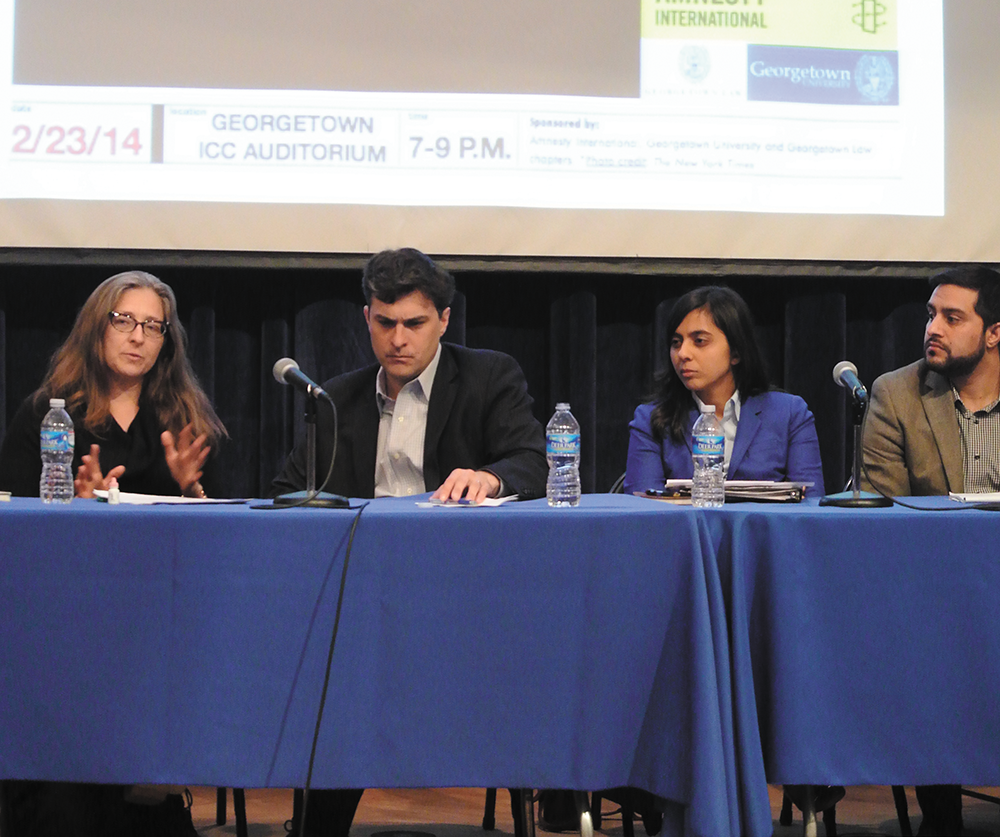
Left to right: Christine Fair, Mark Mazzetti, Naureen Shah, Raha Wala
The event, titled “Truth and Lies: A Discussion on Drones,” featured Christine Fair, a professor in the security studies program, Human Rights First Law and Security Program Advocacy Counsel Raha Wala, Amnesty International USA Advocacy Advisor Naureen Shah and Pulitzer Prize-winning New York Times correspondent Mark Mazzetti.
Mazzetti won his Pulitzer in 2009 for his reporting on the intensifying violence in Pakistan and Afghanistan.
“If you’re going to have a secret war, a drone is a pretty good weapon for it. Because you can carry out strikes in places that are extremely difficult for journalists, human rights groups, international organizations, government officials to get to and actually do hard accounting,” Mazzetti said.
According to Fair, human rights organizations like Amnesty International rely too heavily on first-hand accounts rather than hard data when it comes to verifying information regarding drone strikes in countries such as Pakistan.
“There’s this incredible tendency to believe everything that the interlocutor is telling human rights organizations, and I understand the interest in doing that. We are living in a low-quality information environment, and the stakes are very high. I’m not saying that they have malice, but this is the problem when agenda-driven research dominates the discussion,” Fair said.
In response, Shah asserted the information gathered by Amnesty International remains credited and is the most reliable data possible in the current environment.
“At the end of the day, human rights investigators are not God, they’re not truth-tellers who can claim to have 100 percent knowledge of any incident. But we do this all of the time all over the world, issuing reports on these matters, and we apply the same evidentiary standards here that we do to every other human rights investigation,” Shah said.
Wala touched on the overall issue of the War on Terror, and the difficulty with fighting a war when it is unclear whom the United States is actually at war with, and what the legal boundaries of drone use are.
“We don’t actually know who we’re at war with and who the laws of war supposedly apply to in these circumstances. Those are the key questions and points of ambiguity that need to be focused on in this debate over drones,” Wala said.
A question and answer session followed the discussion. The session allowed the audience of roughly 50 people, mostly members of the Amnesty International chapters and members of the event co-sponsor clubs International Relations Club and GU College Democrats, to expand on the topic.
Andrew Meshnick (COL ’17) asked the speakers about the status of current due process standards for U.S. citizens targeted by U.S. drone strikes and the ability to file death lawsuits in this situation.
While the panelists agreed that legal action is especially difficult due to the secrecy of the U.S. government, Wala cast suspicion on the legal basis for the strikes considering the need for a warrant for most surveillance operations in the United States on its citizens.
“There’s a weird irony here which is that if you want to target an American overseas for surveillance purposes you actually do need to go to a court and get a certain amount of independent judicial review, and the judges in these cases have noted this irony. So it does feel weird that you can’t really surveil someone without judicial intervention, but apparently you can kill them,” Wala said.
In response to a question about the growth of companies that supply these armed drones,
Mazzetti dispelled the notion that these drone pilots are disconnected from their actions and that these targeting killings have become a way to separate soldiers from the horrors of the battlefield.
“I don’t buy the idea of the joystick-mentality for these pilots, the idea that it’s really easy for everyone because it’s like you’re playing a video game. There is that issue of when you’re carrying out an operation you’re seeing it in pretty good definition, and that does have a psychological impact,” Mazzetti said.
The event is part of the “Drone Awareness Project,” conceived by Bassam Sidiki (COL ’16) who thought of the idea after he heard about a similar project at Tufts University where students sent letters to students at a school in Lahore, Pakistan asking them about how drones have impacted their lives.
“I wanted this to be a way to have a transnational conversation about an issue that is affecting so many people’s lives,” Sidiki said. “A university of Georgetown’s stature has to be at the forefront of the discussion on this issue and explore it from many different angles.”
The series continues this Wednesday, Feb. 26, with a discussion on drones and their impact on international law with government and foreign service professor Anthony Arend.














